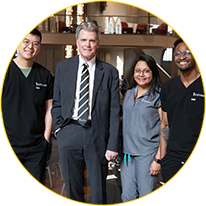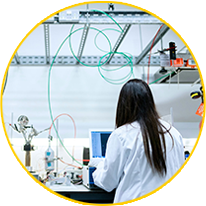What We Do
 Education
Education
- Cultivate a learning environment that is collegial, individualized and innovative.
- Provide educational experiences that allow students to learn and practice critical thinking, deliberate practice and communication with patients, families and the healthcare team.
- Increase awareness of patient safety practices in the healthcare environment.
- Integrate best practices and standards of simulation across the curriculum, accounting for clinical variation.
Scholarship
- Encourage and support faculty and student research in the area of healthcare simulation.
- Evaluate simulation and educational strategies for effectiveness and student achievement of learning outcomes.
Outreach
- Teach and foster interdisciplinary teamwork.
- Encourage and provide educational experiences in simulation to local and regional healthcare providers.
Mission and Vision
 Mission
Mission
The mission of the University of Maryland, Baltimore School of Dentistry Simulation Program is to promote quality, improve patient safety, and advance healthcare education through deliberate practice, inter-professional team training, and innovative research using evidence-based simulation practices.
Vision
The vision of the University of Maryland, Baltimore School of Dentistry Simulation Program is to continually improve learning, enhance patient outcomes and boost educational efficiency at UMSOD, and become an international leader in applying simulation to education, training, patient care delivery and research.
Core Values
 Culture
Culture
We foster a diverse, inclusive, and culturally-sensitive safe practice space that encourages open communication and emphasizes ethics, professionalism, core values, and assessment.
Innovation
We seek to deploy leading-edge clinical and simulation technologies as well as evidence-based instructional methodologies in support of professional development.
Integrity
We encourage honesty and adherence to the highest standards of professional conduct toward the development of competent graduates who serve as ethically responsible leaders in their profession.
Safety
We utilize simulation to provide a safe learning space in which participants can make and learn from mistakes at no risk to patients. Through deliberate practice, feedback, and reflection, our participants become prepared to effectively manage challenges in the clinical environment and improve patient outcomes.



